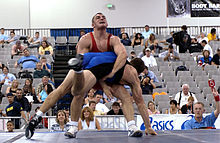Greco Roman Wrestling
 |
|
| Also known as | Greco, Flat Hand Wrestling |
|---|---|
| Focus | Wrestling |
| Country of origin |
Italy Greece |
| Creator | Jean Exbrayat |
| Famous practitioners | Aleksandr Karelin, Mijaín López, Verne Gagne, Carl Westergren, Valery Rezantsev, Hamza Yerlikaya, Hamid Sourian, Vincenzo Maenza, Armen Nazaryan, István Kozma, Gogi Koguashvili, Petar Kirov, Aleksandar Tomov, Nikolay Balboshin,Roman Vlasov, Sim Kwon-Ho, Mnatsakan Iskandaryan, Viktor Igumenov, Aleksandr Kolchinsky, Imre Polyák, Rulon Gardner, Alberto Del Rio, Georg Hackenschmidt, Heiki Nabi, Randy Couture, Hector Milian, Vladimir Zubkov, Big E Langston, Jeff Blatnick, Steve Fraser, Dan Severn, Luis Enrique Mendez, Antonio Cesaro, Candido Mesa Rosell |
| Olympic sport | Yes, since 1896 |
Greco-Roman (US) or Graeco-Roman (UK) wrestling is a style of wrestling that is practiced worldwide. It was contested at the first modern Olympic Games in 1896 and has been included in every edition of the summer Olympics held since 1908. Two wrestlers are scored for their performance in two three-minute periods, which can be terminated early by a pin (or fall). This style of wrestling forbids holds below the waist; this is the major difference from freestyle wrestling, the other form of wrestling at the Olympics. This restriction results in an emphasis on throws because a wrestler cannot use trips to take an opponent to the ground, or avoid throws by hooking or grabbing the opponent's leg.
Arm drags, bear hugs, and headlocks, which can be found in Freestyle, have even greater prominence in Greco-Roman. In particular, a throw known as a suplex is used, in which the offensive wrestler lifts his opponent in a high arch while falling backward on his own neck to a bridge in order to bring his opponent's shoulders down to the mat. Even on the mat, a Greco-Roman wrestler must still find several ways to turn his opponent's shoulders to the mat for a fall without legs, including techniques known as the bodylock and the gut-wrench.
According to United World Wrestling, Greco-Roman wrestling is one of the six main forms of amateur competitive wrestling practised internationally today. The other five forms are Freestyle wrestling, Grappling/Submission wrestling, Beach wrestling, Pankration athlima, Alysh/Belt wrestling and Traditional/Folk wrestling. In February 2013, the International Olympic Committee voted to exclude freestyle and Greco-Roman wrestling from the 2020 Summer Olympic Games, but shortlisted it to be considered for reinclusion. In September 2013, at the 125th Session of the International Olympic Committee (IOC), wrestling was elected as an additional sport.
...
Wikipedia
